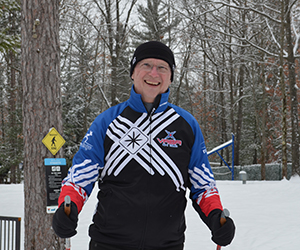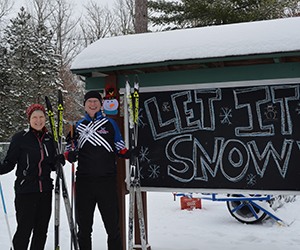Conquering Mountains

You wouldn’t know by looking at 72-year-old John Morris that he’s endured any kind of health-related hardships. Fit and full of life, the Traverse City retiree seems to radiate positive energy and make new friends wherever he goes.
Less than a year ago, John was ringing the bell at Cowell Family Cancer Center, after braving three rounds of treatment, with major pancreatic surgery in between.
But his remarkable journey didn’t begin with his stage III pancreatic cancer diagnosis. It started nearly two years prior at the finish line of the 2017 Michigan Cup Relay ski race, when – quite suddenly – he began to feel ill, followed by a pain in the side of his neck that felt all too familiar.
John suspected he was experiencing a second heart attack, so he quickly located his wife Nancy.
“Honey, I think I’m having another heart attack.”
The Battle Begins
Listening his strange-feeling and possible heart attack symptoms, John went to nearby to Munson Healthcare Grayling Hospital, where he was quickly stabilized before being transferred to Munson Medical Center. As it turned out, John had particular type of blockage that can stop a heart so quickly, it’s often referred to as a “widowmaker” heart attack.
Dr. Roberto Corpus, MD, FACC, performed a mechanical thrombectomy to remove a blood clot from Morris’s left anterior descending (LAD) artery.
“I had great care under Dr. Corpus and Dr. Mast,” John shares. “One of the nurses in the procedure room and cath lab was a nurse I know from church. It was very comforting to have her right there beside Dr. Corpus. It was calming.”
Before Morris knew it, summer had rolled around, and he was wrapping up his last weeks of cardiac rehab at the now Foster Family Community Health Center, just in time for his second favorite season after winter – cycling and hiking season.
“The Munson staff did a wonderful job,” he recalls. “I had a completely successful recovery. And that allowed us to make a trip to Spain the following May for some hiking in the Pyrenees Mountains.”
John couldn’t wait to get back to exploring trails and road cycling with his wife. Together, they’d been adventuring their way through the seasons for decades, whether on skis, road bikes, or hiking trails.
“Our summers are cycling and hiking and our winters are cross-country skiing and snowshoeing. It’s all part of our fitness plan,” John shares with a wink.
A Glitch in Plans
On the final day of their 80-mile self-guided hike through the Pyrenees, John suffered an unfortunate bout of food poisoning.
“After that, I still wasn’t feeling quite right,” he said.
John began to experience low-level pain in his abdomen, and he wondered if it was somehow connected to the pancreatitis he’d experienced just short of a year prior. Wanting to once again be proactive with his health, he made an appointment with his gastroenterologist, Dr. Montgomery Hegewald, MD, A.G.A.F, of Digestive Health Associates in Traverse City.
“He doggedly pursued my pain in spite of it being low level. He was determined to get to the bottom of it," John said.
The nagging feeling that drove John to see Dr. Hegewald might have helped save his life. What he was experiencing was far more than pancreatic inflammation.
Following scans and ultrasounds, he learned on his 71st birthday that his pain stemmed from a tumor growing on the tail of his pancreas. A biopsy revealed cancer in both his pancreas and lymph nodes.
John was naturally scared. His father had died of prostate cancer at age 65. Now, he faced his own diagnosis. Still, he put his full faith in Dr. Hegewald and his oncologist at Cowell Family Cancer Center, Dr. Joshua Ruch, MD, who were both in perfect agreement that he should have surgery with Dr. Mathew Chung, MD, a board certified surgical oncologist and chief of surgical oncology at Spectrum Health in Grand Rapids, who specializes in foregut surgery.
“The fact that they were both willing to refer me there right from the get-go, I knew that if I could get to the point where surgery could be done, that’s where I would go,” he said. “Knowing we have two major institutions here in west Michigan that were willing to work together – I thought that was very laudable.”
But first, John had to get through a round of chemotherapy: four bi-weekly treatments of FOLFIRINOX, which he received at Cowell Family Cancer Center. To his disappointment, Morris’ CAT scan revealed that he would require a second round of chemo before Dr. Chung felt that the timing was right for surgery. After his second round, Dr. Chung was ready for him.
The surgery was a success, but it wasn’t over quite yet. Dr. Chung recommended four more chemotherapy treatments. Considering all he had been through, Morris took the news in fairly good stride.
“When we moved here, we thought that the health care system here was robust and pretty comprehensive,” he explains. “In fact, when Cowell first opened, we went to their first open house. We hoped we would never need it, but it just seemed like the right thing to do. Lo and behold, everything we thought turned out to be absolutely true. We have received great medical care in this community. I couldn’t have asked for better.”
Back on the Trails

It’s a long way for a man who survived two major surgeries and three rounds of chemotherapy in under two years. But ask John, and he’s filled with a new-found passion for returning to the amazing life he leads, along with an immense sense of gratitude for every person who has somehow touched his journey.
“There are so many behind-the-scenes people working hard,” he notes.
“I also don’t forget all the people who went through the clinical trials on FOLFIRINOX to figure that out. They were willing to sacrifice their bodies to find out what was going to work best – how strong a dose, the timing, the order of the drug. I stand on their shoulders.”
Is it a Heart Attack?
Know the warning signs and call 911 immediately. Don’t risk it. Emergencies shouldn’t stay home.